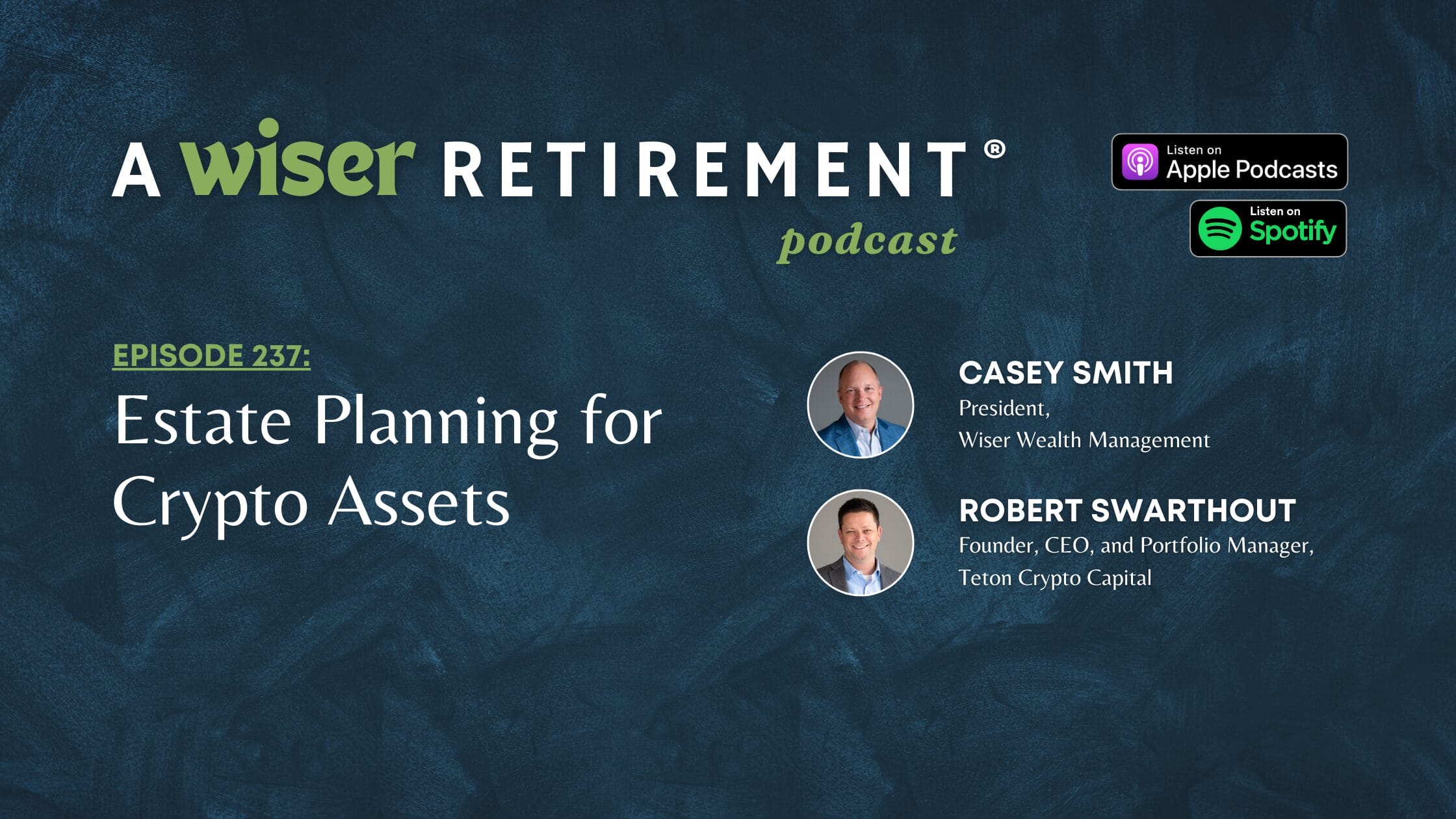
Estate Planning for Crypto Assets
On this episode of A Wiser Retirement® Podcast, Casey Smith and Robert Swarthout, Founder, CEO, and Portfolio Manager of Teton Crypto Capital talk about estate planning for crypto assets, the recent launch of eight Ethereum ETFs, the future of Bitcoin and SAB121.
Listen or Watch:
Summary
Ethereum ETFs
The introduction of Ethereum ETFs marks a significant milestone in the cryptocurrency investment landscape. These ETFs offer investors a lower-fee alternative to the Grayscale Ethereum Trust, which has traditionally had higher fees. The launch of these ETFs has been met with substantial trading volume, indicating strong interest and demand. Additionally, there is speculation about the potential for future crypto ETFs, such as one for XRP, to launch Futures products on major exchanges like the CME.
The Future of Bitcoin
Proposals and ideas are being floated around about the Federal Reserve potentially buying Bitcoin, although the practicality and implications of such actions remain uncertain. Additionally, there is ongoing debate about the idea of the U.S. establishing a Bitcoin reserve and its potential impact on the value of the dollar.
Estate Planning for Crypto Assets
Estate planning for crypto assets is an emerging area that requires careful consideration. Whether crypto assets are held on exchanges or through self-custody, it is crucial to have proper documentation and planning in place. This ensures that digital assets are accessible and protected in the event of the owner’s death. As the regulatory environment continues to develop, the complexities of handling crypto assets in estate planning will become more apparent. It is essential for individuals to plan thoughtfully and work with professionals who understand the unique challenges posed by digital assets. Here’s a quick guide to help you manage your crypto assets.
Crypto Custody Options
- Third-Party Exchange: If your cryptocurrency is held with a third-party exchange like Coinbase, the process of estate planning is relatively straightforward. You need to ensure that your heirs can access your account details, such as login information and two-factor authentication methods.
- Self-Custody: If you hold your crypto in a self-custody wallet, whether software or hardware, securing and passing on these assets becomes more complex. You must ensure your heirs have access to the private keys or recovery phrases.
Crypto Backup and Security
Backing up your information is crucial. Here are some methods:
- Legal Documentation: Work with an attorney to create a document detailing your crypto holdings and how they can be accessed. This document can include instructions for accessing wallets and any passwords or keys needed.
- Safe Deposit Box: Store a physical copy of your recovery phrases, private keys, and other essential information in a secure, physical location like a safe deposit box.
- Password Manager: For digital storage, consider using a password manager. This tool can securely store all necessary credentials and can be accessed by your designated heirs.
Links:
- Click here to download one of our free guides that covers financial planning topics like retirement, investing, taxes, divorce, and more!
Connect:
- Click here to schedule a consultation with one of our financial advisors.
- Follow us on social media: Twitter, Instagram, Facebook, LinkedIn, and YouTube.
- Learn more about A Wiser Retirement® Podcast and access previous episodes.
Share This Story, Choose Your Platform!
Wiser Wealth Management, Inc (“Wiser Wealth”) is a registered investment adviser with the U.S. Securities and Exchange Commission (SEC). As a registered investment adviser, Wiser Wealth and its employees are subject to various rules, filings, and requirements. You can visit the SEC’s website here to obtain further information on our firm or investment adviser’s registration.
Wiser Wealth’s website provides general information regarding our business along with access to additional investment related information, various financial calculators, and external / third party links. Material presented on this website is believed to be from reliable sources and is meant for informational purposes only. Wiser Wealth does not endorse or accept responsibility for the content of any third-party website and is not affiliated with any third-party website or social media page. Wiser Wealth does not expressly or implicitly adopt or endorse any of the expressions, opinions or content posted by third party websites or on social media pages. While Wiser Wealth uses reasonable efforts to obtain information from sources it believes to be reliable, we make no representation that the information or opinions contained in our publications are accurate, reliable, or complete.
To the extent that you utilize any financial calculators or links in our website, you acknowledge and understand that the information provided to you should not be construed as personal investment advice from Wiser Wealth or any of its investment professionals. Advice provided by Wiser Wealth is given only within the context of our contractual agreement with the client. Wiser Wealth does not offer legal, accounting or tax advice. Consult your own attorney, accountant, and other professionals for these services.





